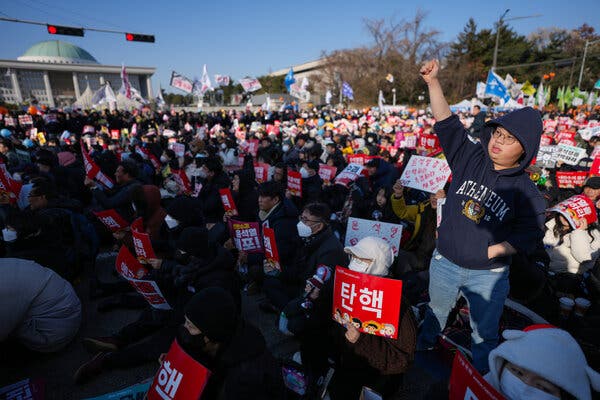Plus, we retraced one of Mayor Eric Adams’s lavish trips to Istanbul.

Israel killed Hezbollah’s leader and struck Yemen
Hezbollah’s leader, Hassan Nasrallah, was killed on Friday near Beirut, Lebanon, in an attack that Israel’s military said had hit the militia’s headquarters. Nasrallah was a beacon for anti-Israel forces across the Middle East and beyond, and his death is a major blow to Hezbollah.
Hezbollah and Israel’s military chief of staff vowed to continue fighting, and Israel continued to bombard Lebanon over the weekend. Israel also expanded its targeting of Iran-backed militant groups yesterday, striking Yemen after Houthi fighters aimed missiles at Israel. At least four people were killed in the strikes in Yemen.
Israel’s strike on Nasrallah was the culmination of several startling moves that suggest the Israeli prime minister, Benjamin Netanyahu, feels unconstrained by foreign criticism, analysts say. His authorization of the strike came on the same day that foreign diplomats walked out of his speech to the U.N. General Assembly.
In Iran, fissures have opened within the Iranian government over how to respond to Nasrallah’s killing. Significantly, Ayatollah Khamenei signaled that it would be Hezbollah, not Iran, that would be leading any response to Israel.
Details: Two senior Israeli defense officials told The Times that more than 80 bombs were dropped to kill Nasrallah. A Times analysis showed that the attack destroyed at least four apartment buildings, and the damage was consistent with 2,000-pound bombs.
Analysis: Over almost a year of war in the Middle East, major powers have proved incapable of stopping or even significantly influencing the fighting, my colleague, Roger Cohen, writes. After the killing of Nasrallah, the Western-led attempt to broker a peace agreement between Israel and Hezbollah seems uncertain. These failures reflect a turbulent world of decentralized authority that seems likely to endure.



